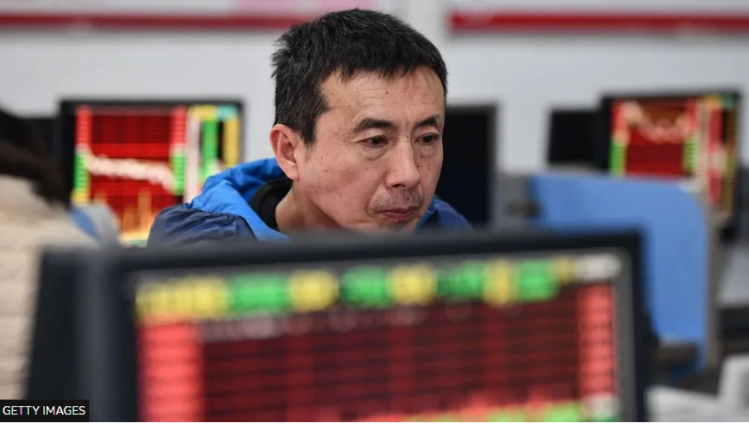China has tightened its financial industry rules as the government tries to halt a deepening sell-off in the world's second largest economy.
Nearly $6tn (£4.7tn) has been wiped off Chinese and Hong Kong stocks since their most recent peak three years ago.
The China Securities Regulatory Commission (CSRC) says the measures will create "a fairer market order".
Under the new rules limits will be put on so-called "short-selling" from Monday.
Short selling is when a trader bets that a share or other asset will fall in value. They borrow the asset and sell it immediately with the aim of buying it back later at a lower price and keeping the difference.
Defenders of short selling say it can play an important part in financial markets, by helping find the true value of an asset.
However, some critics see short selling as a ruthless trading strategy that undermines companies.
The latest announcement by the CSRC comes after a series of informal measures introduced by the regulator over the last year did little to shore up financial markets.
The CSRC said that following "a complete suspension of the lending of restricted stocks", which takes effect today, further limitations on securities lending will be introduced from 18 March.
Last week, the country's premier Li Qiang asked authorities to take more "forceful" measures to stabilise share prices.
The sell-off in China's stock market comes as some investors are concerned that the country's economy could face a long period of slow economic growth.
Central to China's economic problems is its property market. For two decades, the sector boomed and accounted for a third of the country's entire wealth.
But when the government put limits on how much developers could borrow in 2020, they started owing billions which they could not pay back.
When property giant Evergrande defaulted in 2021, after missing a crucial repayment deadline, it triggered the current crisis.
On Monday, the firm was ordered to liquidate by a court in Hong Kong, sending its shares down by more than 20% before trading in them was suspended.
The real estate sector's troubles have also revealed issues faced by the country's so-called "shadow banks" which have lent billions of dollar to developers.
The shadow banks operate in a very similar way to traditional banks but are not subject to the same regulations.
In November, Chinese officials launched an investigation into "suspected illegal crimes" at one of the country's biggest shadow banks, Zhongzhi Enterprise Group, which filed for bankruptcy and earlier this month.
There are also a number of indications that China's once-booming economy is slowing sharply.
Official figures show the economy expanded by more than 5% in 2023. While that is stronger growth than many other major economies it is much lower than China saw before the pandemic.
Meanwhile, the country's exports, which have been a major contributor to its growth, fell last year.
At the same time, youth unemployment hit a record high and local government debt has jumped.
Latest Stories
-
PUWU hoists red flags nationwide over gov’t plan to privatize ECG and NEDCo
1 hour -
Kwame Yesu’s latest project blends raw emotion with rap precision
2 hours -
Court remands Mobile Money robbery suspect into police custody
3 hours -
BIDEC and Ghana Dance Association engages Ghana Tourism Authority on dance tourism
3 hours -
Ghana pushes forward with National AI policy through multi-stakeholder engagement
4 hours -
Mahama pays tribute to late Pope Francis
4 hours -
W/R police clamp down on crime: Suspects arrested for vehicle theft, gold robbery, galamsey
4 hours -
This Saturday on Newsfile: Chief Justice suspension and galamsey take centre stage
4 hours -
GIMPA GRASAG inaugurates study rooms, business centre to support academic work
4 hours -
Be circumspect with selection of new investors for Damang Mine – ACEP to government
4 hours -
Chieftaincy Institution in Ghana at a Crossroads – A Perspective by Andrews Kofi Anokye (KOANS)
6 hours -
Offinso highway robbery: Police mount hunt for killers of bus conductor
6 hours -
‘We will fish him out’ – DCOP Teye-Cudjoe vows to arrest soldier behind Nyinahin shooting
6 hours -
Traditional leaders laud AngloGold Ashanti’s youth dev’t initiatives in Obuasi
6 hours -
Cyra Pamela Koranteng resigns as Judicial Secretary, deputy elevated
6 hours

